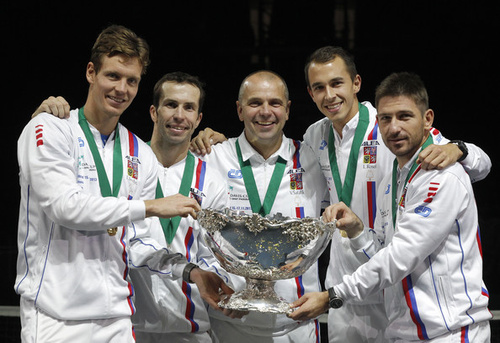Don't miss any stories → Follow Tennis View
FollowFive Thoughts from the Davis Cup Final
The Davis Cup final in Belgrade this weekend may not have featured dramatic matches or altered any of the season’s main storylines. Still, the Czech Republic’s successful title defense illuminated several reasons why this team competition stands out from the rest of the calendar.

1) No player can carry his nation by himself.
Holding a trump card like world No. 2 Novak Djokovic can provide an enormous boost in two matches—but only two. The opposing team still can prevail by securing the other three, a task less imposing than it looks at first glance if the team with the superstar lacks complementary pieces. Serbia would have fielded a worthy complement to Djokovic in Janko Tipsarevic if that veteran had not withdrawn with a foot injury. Without Tipsarevic, though, the steep drop-off to world No. 117 Dusan Lajovic doomed Djokovic’s team against a Czech squad with a solid No. 2 in Radek Stepanek. In fact, Stepanek may be the ideal type of player for Davis Cup: a savvy veteran capable in both singles and doubles.
2) Doubles can be extremely (excessively?) important.
Although it is not the final rubber, the third rubber often serves as a hinge between the opening statements of Friday’s singles and the climax of Sunday’s singles. When there are multiple mismatches in singles, the doubles plays an especially critical role in thrusting a team ahead 2-1 before the final day. With that lead, the team need only capitalize on its remaining mismatch, while the opponent must hope for its underdog to deliver. This situation emerged in the final when singles No. 1s Djokovic and Tomas Berdych cruised through their Friday matches to leave the tie poised at 1-1. With both men again heavily favored in Sunday’s reverse singles, the doubles functioned virtually as a decisive rubber. One could argue that this elevated importance places too much weight upon a lesser form of the sport, or that it gives doubles a welcome—and rare—chance to matter.
3) Distant events can have a dramatic ripple effect.
At Monte Carlo this spring, Viktor Troicki refused a blood test required by tennis doping authorities. That decision and the ensuing suspension may well have cost Serbia a second Davis Cup title in four years. With Tipsarevic unavailable, Serbia likely would have substituted Troicki as its singles No. 2, a role that he filled when his nation won the Cup in 2010. Troicki played the hero’s role in the final that year, defeating Michael Llodra in the decisive fifth rubber. This is not to say that he did not deserve his suspension, for he did, or that Stepanek could not have defeated him in the fifth rubber, for he could have. (In fact, Stepanek played a similarly heroic role in a decisive fifth rubber last year, upsetting the higher-ranked Nicolas Almagro to win the Cup.) But Serbia would have enjoyed a significantly stronger chance of victory if Troicki had replaced Tipsarevic this weekend.
4) The Sancho Panzas can outshine the Don Quixotes.
When all of the marbles are at stake in a winner-take-all contest, most sports teams try to give their best player or players a chance to shine. Davis Cup departs from this model by scheduling the singles No. 1s to square off in the fourth rubber and the singles No. 2s in the fifth. Granted, that order increases the chance of involving the best player from both teams, since many ties do not reach a decisive fifth rubber, but most evenly matched ties do reach a fourth. The order also gives underdogs a chance to seize the spotlight that eludes them for most of their careers, and it rewards depth over star power, which seems fair in a team competition. On the other hand, neither Serbia nor the Czech Republic would have chosen to rest their hopes on Lajovic or Stepanek if they had just one match to establish their tennis credentials. Can a format be logical and counter-intuitive at the same time?
5) The whole can be greater than the sum of the parts.
Neither Berdych nor Stepanek has earned a reputation for himself as one of the most genteel, affable competitors on the ATP Tour. (And that is a genteel way to put it.) Putting two such prickly personalities on the same side of the net as each other thus resembles a recipe for disaster in most circumstances. Yet this duo that rarely plays together now owns a 14-1 record in Davis Cup doubles, many of those matches in situations as critical as this year’s final. Berdych and Stepanek defeated a quality team in Nenad Zimonjic and Ilja Bozoljac, who had defeated Bob and Mike Bryan in Davis Cup this spring. Serbia may second-guess its decision not to substitute Djokovic into the doubles rubber, considering its immense significance. But the cohesion that flowed through the Czech team probably would have trumped whatever combination the hosts could have fielded. Sharing a court with each other brought out the best in both Berdych and Stepanek, not often seen in individual competition.
***
Up next for me is an off-season awards series on the ATP. The first article will appear on Thursday.










